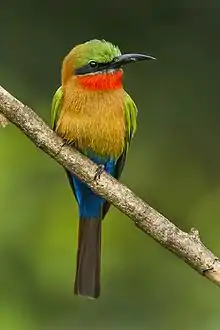Merops (genus)
Merops is a large genus of bee-eaters, a group of near passerine birds in the family Meropidae. The members of this Old World family are characterised by richly coloured plumage, slender bodies and usually elongated central tail feathers. They predominantly eat insects, especially bees, wasps and hornets, which are caught in the air.
| Merops | |
|---|---|
 | |
| Six common African Merops bee-eaters | |
| Scientific classification | |
| Kingdom: | Animalia |
| Phylum: | Chordata |
| Class: | Aves |
| Order: | Coraciiformes |
| Family: | Meropidae |
| Genus: | Merops Linnaeus, 1758 |
| Type species | |
| Merops apiaster Linnaeus, 1758 | |
| Species | |
|
see text | |
All bee-eaters are in the genus Merops and subfamily Meropinae except for three Asiatic bearded bee-eaters in the subfamily Nyctyornithinae (in genera Nyctyornis and Meropogon). The genus Merops was introduced by the Swedish naturalist Carl Linnaeus in 1758 in the tenth edition of his Systema Naturae.[1] The type species is the European bee-eater.[2] The genus name is Ancient Greek for "bee-eater".[3]
Taxonomy and systematics
Twenty-four species are recognized:[4]
| |||||||||||||||||||||||||||||||||||||||||||||||||||||||||||||||||||||||||||||||||||||||||||||||||||||||||||||||||||||||||||||||||||||||||||||||||||||||||
| Bayesian consensus phylogeny based on nuclear and mitochondrial sequences of Meropidae (missing only Nyctyornis athertoni and M. revolii)[5] |
| Image | Common name | Scientific name | Distribution |
|---|---|---|---|
 | Black-headed bee-eater | Merops breweri | Angola, Central African Republic, Republic of the Congo, Democratic Republic of the Congo, Ivory Coast, Gabon, Ghana, Nigeria, and South Sudan. |
 | Blue-headed bee-eater | Merops muelleri | Cameroon, Central African Republic, Republic of the Congo, Democratic Republic of the Congo, Gabon, Equatorial Guinea, and Kenya |
.jpg.webp) | Blue-moustached bee-eater | Merops mentalis | Cameroon, Ivory Coast, Equatorial Guinea, Ghana, Guinea, Liberia, Nigeria, and Sierra Leone. |
 | Black bee-eater | Merops gularis | from Sierra Leone to southeast Nigeria |
.jpg.webp) | Swallow-tailed bee-eater | Merops hirundineus | sub-Saharan Africa |
.jpg.webp) | Little bee-eater | Merops pusillus | Sub-Saharan Africa |
.jpg.webp) | Blue-breasted bee-eater | Merops variegatus | Angola, Zambia, Tanzania, Uganda, the Democratic Republic of the Congo, Nigeria and Cameroon |
_2.jpg.webp) | Cinnamon-chested bee-eater | Merops oreobates | Burundi, Democratic Republic of the Congo, Ethiopia, Kenya, Rwanda, South Sudan, Tanzania, and Uganda. |
 | Red-throated bee-eater | Merops bulocki | Benin, Burkina Faso, Cameroon, Central African Republic, Chad, Democratic Republic of the Congo, Ivory Coast, Ethiopia, Gambia, Ghana, Guinea, Guinea-Bissau, Mali, Mauritania, Niger, Nigeria, Senegal, Sierra Leone, Sudan, Togo, and Uganda. |
_Namibia.jpg.webp) | White-fronted bee-eater | Merops bullockoides | sub-equatorial Africa. |
.jpg.webp) | Somali bee-eater | Merops revoilii | Ethiopia, through Somalia to northern and eastern Kenya |
_female.jpg.webp) | White-throated bee-eater | Merops albicollis | southern Senegal to Uganda. |
.jpg.webp) | Böhm's bee-eater | Merops boehmi | Democratic Republic of the Congo, Malawi, Mozambique, Tanzania, and Zambia. |
 | Green bee-eater | Merops orientalis | sub-Saharan Africa from Senegal and the Gambia to Ethiopia, the Nile valley, western Arabia and Asia through India to Vietnam |
_Namibia.jpg.webp) | Blue-cheeked bee-eater | Merops persicus | Northern Africa, and the Middle East from eastern Turkey to Kazakhstan and India |
 | Olive bee-eater | Merops superciliosus | Angola; Botswana; Burundi; Comoros; Democratic Republic of the Congo; Djibouti; Eritrea; Ethiopia; Kenya; Madagascar; Malawi; Mayotte; Mozambique; Namibia; Rwanda; Somalia; South Sudan; Sudan; Tanzania; Uganda; Zambia; Zimbabwe |
.jpg.webp) | Blue-tailed bee-eater | Merops philippinus | southeastern Asia. |
.jpg.webp) | Rainbow bee-eater | Merops ornatus | Australia, New Guinea, and some of the southern islands of Indonesia. |
.jpg.webp) | Blue-throated bee-eater | Merops viridis | south-east Asia |
.jpg.webp) | Chestnut-headed bee-eater | Merops leschenaulti | India east to Southeast Asia. |
 | European bee-eater | Merops apiaster | southern Europe and in parts of north Africa and western Asia. |
.jpg.webp) | Rosy bee-eater | Merops malimbicus | Angola, Benin, Burkina Faso, Republic of the Congo, Democratic Republic of the Congo, Ivory Coast, Equatorial Guinea, Gabon, Ghana, Nigeria, and Togo. |
 | Northern carmine bee-eater | Merops nubicus | Benin, Burkina Faso, Cameroon, the Central African Republic, Chad, the Democratic Republic of the Congo, Côte d'Ivoire, Eritrea, Ethiopia, Gambia, Ghana, Guinea, Guinea-Bissau, Kenya, Liberia, Mali, Mauritania, Niger, Nigeria, Senegal, Sierra Leone, Somalia, Sudan, Tanzania, Togo and Uganda. |
_(16732824032).jpg.webp) | Southern carmine bee-eater | Merops nubicoides | KwaZulu-Natal and Namibia to Gabon, the eastern DRCongo and Kenya. |
Former species
Formerly, some authorities also considered the following species (or subspecies) as species within the genus Merops:
- Magpie-lark (as Merops picatus)
| Wikimedia Commons has media related to Merops. |
| Wikispecies has information related to Merops. |
References
- Linnaeus, Carl (1758). Systema Naturae per regna tria naturae, secundum classes, ordines, genera, species, cum characteribus, differentiis, synonymis, locis (in Latin). Volume 1 (10th ed.). Holmiae:Laurentii Salvii. p. 117.
- Peters, James Lee, ed. (1945). Check-list of Birds of the World. Volume 5. Cambridge, Massachusetts: Harvard University Press. p. 233.
- Jobling, James A (2010). The Helm Dictionary of Scientific Bird Names. London: Christopher Helm. p. 251. ISBN 978-1-4081-2501-4.
- "IOC World Bird List 7.1". IOC World Bird List Datasets. doi:10.14344/ioc.ml.7.1.
- Marks, Ben D.; Weckstein, Jason D.; Moyle, Robert G. (2007). "Molecular phylogenetics of the bee-eaters (Aves: Meropidae) based on nuclear and mitochondrial DNA sequence data". Molecular Phylogenetics and Evolution. 45: 23–32. doi:10.1016/j.ympev.2007.07.004. PMID 17716922.